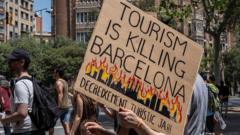Protests erupted in central Barcelona on Sunday as residents voiced their frustration over the burgeoning tourism industry that some believe is suffocating the local community. Demonstrations featured cries of "Go Home!" directed at tourists recording the events, while bemused café-goers were playfully doused with water pistols. Protesters plastered stickers on luxury stores and displayed signs like "Your Airbnb used to be my home" in an outpouring of discontent amid rising housing costs.
Tourism is a vital component of Spain's economy, with Barcelona hosting around 15 million visitors annually, dwarfing its local population. This influx, however, has raised concerns about over-tourism and its effects on the city’s residents. Activist Marina, who joined the march, explained the dire situation for locals: "The rents are super high because of BnBs and also the expats who come and live here for the weather. Our goal is not to stop tourism, but to manage it more reasonably."
The picturesque Sagrada Familia, designed by architect Antoni Gaudí, was targeted during the march, underscoring the paradox faced by many residents who rely on tourism while also feeling its adverse effects. Elena, a local marine biologist, articulated the struggle faced by young people, saying, "Young people can't afford living here… normal things like coffee are really expensive for our salaries."
Some residents, like 80-year-old Pepi Viu, have been directly impacted. Recently evicted from her home of ten years due to rising rents, she now finds herself in a hostel, lamenting the lack of support available for residents. “There’s only tourist flats now, but we residents need somewhere to live!” she said, highlighting the urgent need for solutions.
Meanwhile, some landlords are feeling the heat from the protests as well. Jesus Pereda, who owns two tourist flats, insists that landlords are being wrongly blamed for the city's housing crisis. He pointed out that the market has changed, claiming that remote workers moving to Barcelona are responsible for the skyrocketing rent prices. "They earn more and pay more. You can't stop that," he argued while defending the distribution of tourism across the city as beneficial for local businesses.
In response to the growing unrest, Barcelona's authorities announced a ban on short-term rentals from 2028, potentially affecting 10,000 tourist apartment licenses. This decision has led landlords like Pereda to fear job losses and financial uncertainty. He maintains that without tourism, Barcelona risks falling into an "existential crisis," given its sizable contribution to Spain's GDP.
As the protests unfolded, chants of "You're all guiris!"—a colloquial term for foreigners—filled the air, accompanied by firecrackers and red smoke. Similar sentiments echoed across Spain and in neighboring countries, indicating a widespread concern regarding the balance of tourism with the rights and needs of local populations. As summer approaches, Spain anticipates a record number of tourists, a situation that may evolve into a critical dialogue about sustainable tourism practices.





















